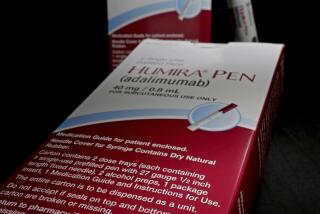Insurer delivers a setback to Amgen
Thousand Oaks biotech giant Amgen’s summer doldrums are stretching into the fall.
This month Aetna Inc., one of the nation’s largest insurers, quietly changed its reimbursement guidelines for the company’s anemia drugs, echoing Medicare’s new tighter reimbursement policy for the medicines.
Aetna is the largest private insurer to do so, and analysts expect others to follow soon. That could seriously harm the company’s financial outlook because payments by private insurers account for half of the company’s sales among cancer patients.
“Aetna is likely to be the first of many insurers to change their guidelines,” said Bear, Stearns & Co. biotech analyst Mark Schoenebaum.
The drugs, which are sold by Amgen under the brand names Aranesp and Epogen, treat anemia by boosting red blood cell production and raising hemoglobin levels. A similar product, Procrit, is manufactured by Amgen but sold by Johnson & Johnson. More than 1 million cancer and dialysis patients in the U.S. took the drugs last year.
Recent studies have raised concerns that the drugs may be harmful in some patients and at higher dosages.
People without anemia normally have hemoglobin levels of 13 to 18 grams per deciliter of blood. Research has shown that using drugs to keep anemic patients’ hemoglobin levels around 10 grams per deciliter enables the blood to carry enough oxygen for the patient to avoid a transfusion.
In July, the federal government severely lowered the maximum dose for which it would provide reimbursement for the drugs.
Aetna’s new policy is slightly less restrictive than Medicare’s but severe nonetheless. It specifies that patients have lower hemoglobin levels before the drug is administered. It does include an exception for patients with higher hemoglobin levels who have demonstrated anemia symptoms.
Aetna is likely to face a backlash over its decision. Another insurer, Blue Shield of California, attempted to change its policy this summer to restrict dosages of the anemia drugs but partially reversed itself weeks later after complaints from members and some doctors. Aetna said it had no plans to rescind its decision.
“Our criteria are consistent with those of medical societies with regard to the treatment of anemia in patients on chemotherapy or who have chronic renal disease,” said Rachelle Cunningham, an Aetna spokeswoman.
Overall, the anemia drugs accounted for $7 billion in sales for Amgen last year, nearly half its revenue. After Medicare’s decision, Aranesp sales last quarter dropped 20% in the U.S.
On Monday, Johnson & Johnson reported that domestic Procrit sales declined an additional 15% during its most recent quarter, and some analysts expect Amgen to report a similar decline when it releases earnings next week.
Amgen has publicly criticized Medicare’s recent coverage change as “incompatible with good clinical practice” and is appealing the decision.
When the company announced plans over the summer to cut its workforce by as much as 14%, it blamed the move partly on the government’s decision.
On Thursday, Amgen appeared less troubled by Aetna’s new guidelines.
“The Aetna policy is much better aligned with the [Food and Drug Administration] label and guidelines from the leading oncology medical societies than Medicare’s policy,” said David Polk, an Amgen spokesman.
Meanwhile, a high-stakes patent lawsuit involving Amgen and Roche Holding went to the jury Thursday after a six-week-long trial.
Amgen is suing Roche for its plans to introduce an anemia competitor, Mircera, in the U.S. as early as this year. Amgen’s patent on its anemia franchise is expected to extend until 2011.
Roche maintains that the patent for its version of the drug is valid. Analysts say that if the company prevails and the drug gets federal approval, it could shave as much as $1 billion from Amgen’s sales.
Still, most analysts believe Amgen has a good chance of winning. On a pretrial motion, the judge has ruled that Mircera infringed one Amgen patent, although the jury may still decide that Roche can legally sell its product.
“Wall Street’s expectation is clearly that Amgen is going to win that trial,” Schoenebaum said. “In the event of a victory, there won’t be much upside for the stock. In the off chance they lose, expect their shares to fall materially.”
Investors appeared to be taking in stride the news of Aetna’s policy change and the fact that the trial is wrapping up. The shares, which are down nearly 25% this year, rose 30 cents to $56.71 on Thursday.
More to Read
Inside the business of entertainment
The Wide Shot brings you news, analysis and insights on everything from streaming wars to production — and what it all means for the future.
You may occasionally receive promotional content from the Los Angeles Times.










